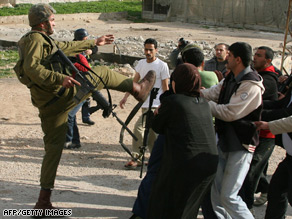
“My eyes stung, I was coughing, my nose was running,” Ben Wedeman, CNN senior correspondent in Jerusalem describes his encounter with tear gas. It wasn’t “for the first time last Friday -- during a day-long clash between Palestinian kids and Israeli soldiers in the West Bank town of Na'alin, on the West Bank,” Wedeman says.
Wedeman and his crew had gone to Na’alin, Jerusalem to monitor the Palestinian view of Tuesday's Israeli elections- which ended in a near draw.
Both front runners, Tzipi Livni and Benjamin Netanyahu, fell well short of a majority vote with Livni's party winning 28 Knesset seats and Netanyahu's party winning 27 seats out of a big 120-seat Knesset.
As they sheltered from tear gas behind a house, Na'alin resident Hani Khawaja told Wedeman, "I don't expect anything to come out of the elections that will please the Palestinians. Just killings, expulsions and land confiscations."
Out of all of the towns and villages, Wedeman chose an Na’alin because he thought it would be “the perfect place to see what Palestinians were thinking” and what he heard “was universal pessimism”.
Na'alin is an old town in the West Bank that is in the forefront of the conflict between Israelis and Palestinians. But in recent years, neighboring Israeli settlements have increasingly intruded on Na'alin's farmland, and Israel, on grounds of security, has built its security barrier around the town which creates a deep hostility between both the Israelies and Palestinians.
“I've covered almost every Israeli election since 1996,” Wedeman says, “with each election, the Palestinian feeling of despair and hopelessness only deepens.”
When talking to people in Na’alin, Wedeman says that “no one I spoke with expressed the slightest hope that any of the leading candidates --Likud's Benjamin Netanyahu, Kadima's Tzipi Livni, Israel Beitenu's Avigdor Lieberman and Labour's Ehud Barak -- would do anything to remove the settlements that are slowly closing in on Na'alin.”
But according to Wedeman, one man, Ayub Srour, had a slightly different approach. He’d rather Israeli leaders be honest about their intentions, and not raise hopes only to crush them later. He wants the Likud leader and long-time hardliner Benjamin Netanyahu to win. "At least he's honest. He says he'll expel us, and he will expel us. He says he's slaughter us, and he will slaughter us."
Since the last election in the spring of 2006, Palestinians have seen Israel and Hezbollah go to war, West Bank settlements continue to expand, Hamas and Fatah fight it out in Gaza with Hamas taking control in June 2007.
They've also seen a series of Israeli incursions into Gaza, culminating recently in the 22-day Israeli offensive that left large parts of the strip in ruins.
Meanwhile many Palestinians say their leadership, described as moderate and pro-western, in Ramallah is incapable of reversing the trend of settlement expansion.
The same leadership hasn’t been able to convince Israel to remove few of the hundreds of roadblocks and checkpoints that make travelling around the West Bank a test of patience and endurance.
When Palestinians look back over the last 15 years since the Oslo Accords were signed, they've seen their land go from bad to worse which has made many Palestinians consider a one-state solution.
The one-state solution is outrageous to many Israelis. One of Israel’s biggest concerns is that the rate of Palestinian births are so high that Palestinians could well become a majority within a generation.
Israel's current caretaker prime minister, Ehud Olmert, warned in November 2007 that if Israel doesn't move quickly to achieve a two-state solution that it will be in a similar circumstance like that of South Africa during the apartheid area where the minority, like the Israeli Jews, rule over the majority, in this case the Palestinians, by means of force, repression and discriminatory laws.
Yet many Palestinians will argue that this is already the case in Israel, citing Israeli restrictions on movement, residence, and work.
But back in Na'alin, there is some cooperation occurring. Kids are seen throwing stones at Israeli troops while Israeli soldiers shoot tear gas at them. But it’s not only young Palestinians protesting but young Israelis, self-described anarachists that take part in the protests as well.
Although cooperation between Palestinians and Israelis exists, it’s still an increasingly rare commodity. And this election probably won't do anything to bridge the growing gap between the two -- the curious friendship in Na'alin despite.
Presheva Valley and Serbia's Dirty War
17 years ago
1 comments:
comments via email
Post a Comment